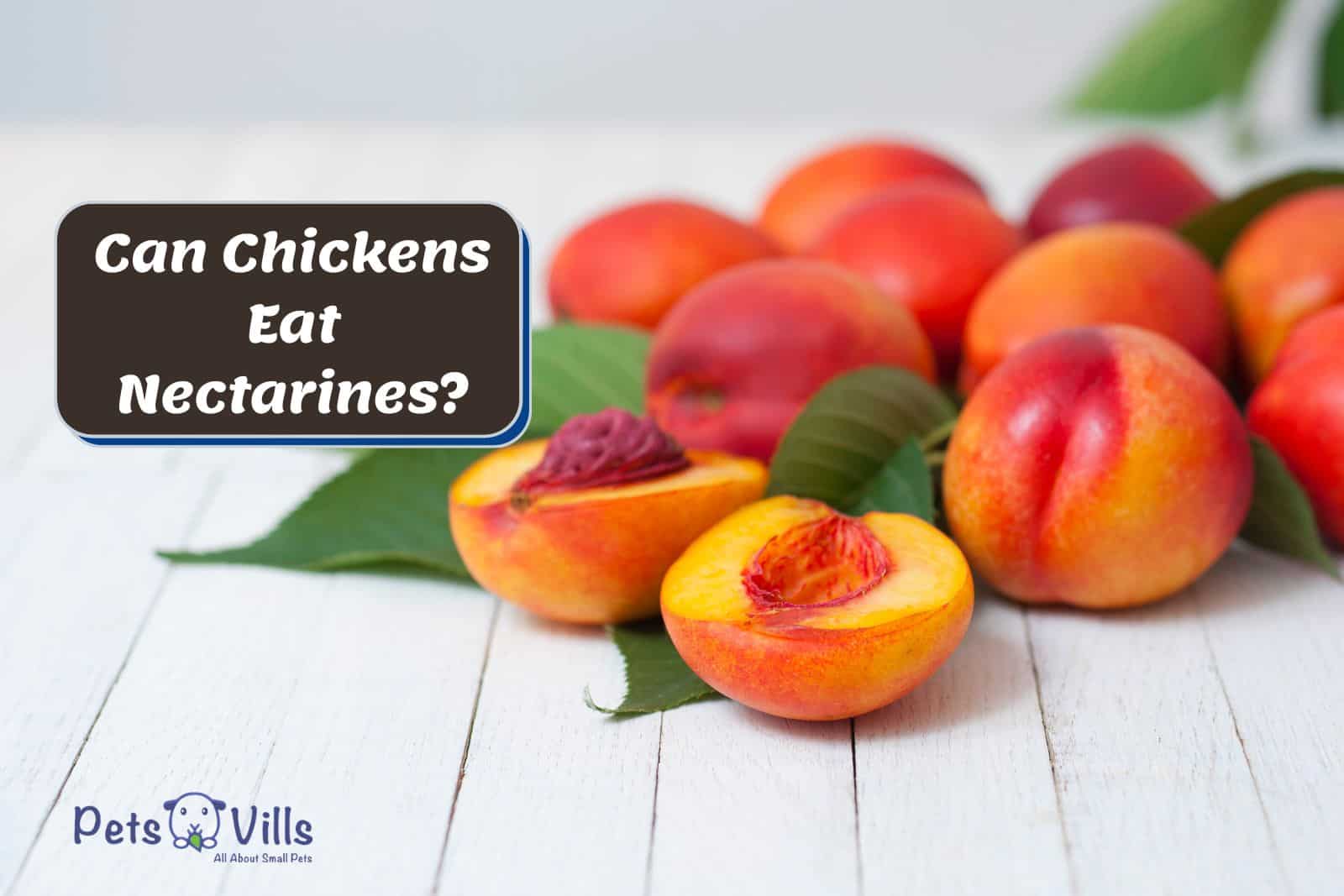Nectarines are a popular seasonal fruit with juicy flesh packed with nutrition. So it makes sense that some poultry owners wonder if can chickens eat nectarines.
After extensive research, I found experts agree that nectarines are a nutritious, safe snack for chickens. But the seed and pit need removal before serving because they contain harmful toxins (1).
Of course, these pieces of info are just some of the worthwhile things I’ve learned.
So read on, and find out if nectarines would be a solid addition to your chickens’ diet.
Table of Contents
Key Takeaways
- If prepared correctly, nectarines can be a healthy treat for chickens. But you must remove the leaves, seeds, and pits as they contain a toxin called amygdalin.
- This preparation is worth your effort due to the various health benefits. Nectarines provide chickens with high antioxidant, water, and fiber content.
- You have two options when feeding nectarines to chickens. These fruits can be served whole (toxic components removed) or mixed into the feeds.
- Poultry owners have to be careful about how often to serve nectarines. These fruits have high sugar content, so limit it to once or twice weekly.
Is It Safe To Feed Nectarines To Chickens?
Yes, nectarines are safe for chickens. But there are a few caveats since the leaves, seeds, and pit are potentially toxic.
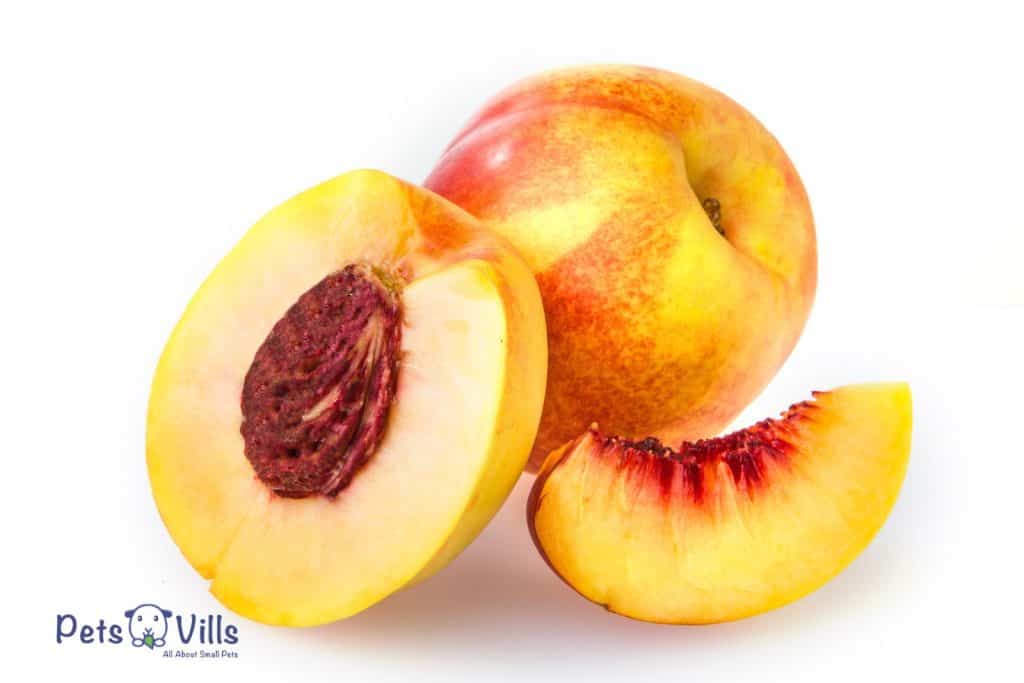
So what does it mean? It boils down to the flesh part of nectarines only being safe for chicken consumption.
The rest can contain a toxin called amygdalin (2). It’s nothing you want to deal with, considering it breaks down into hydrogen cyanide when the chickens ingest it.
Luckily, only in large amounts can it harm the chickens. But in any case, it’s best not to let them eat any part of the nectarines besides the flesh.
It’s not like you’d want them to ingest these parts even without the toxin. After all, the flesh is where all the nutrition is concentrated.
Is It Healthy For Chickens To Eat Nectarines?
If served correctly, nectarines are perfectly safe and healthy for chickens. These stone fruits even provide health benefits that could improve their lives significantly.
Let’s look at some to explain what they can offer your chickens. It’ll make deciding whether to add them to the diet much easier.
#1 Nectarines are High in Antioxidants
One of the primary benefits provided by nectarines is being high in antioxidants. These components will help “boost your chicken’s immunity and makes them stronger”(3).
In simpler terms, more antioxidants will make your chickens healthier. So nectarines offer a convenient way to provide them.
Furthermore, my chickens seem to love them. I can’t blame given the outstanding taste of nectarines.
#2 Nectarines Are High Water Content
Nectarines are a more valuable secondary hydration source than most realize. In fact, these tasty treats are about 88% of water content.
So nectarines come in handy during those hot summer days. After all, chickens tend to be very active on summer days, foraging for food.
In this situation, nectarines will then become very handy in preventing dehydration. I’ve used them on several occasions to keep my flock hydrated.
#3 Nectarines Are High In Fiber
Another high-valued benefit of nectarines is their high fiber content. As most people know, fiber is crucial to maintaining digestive systems.
Chickens aren’t any different, so nectarines can help maintain and keep them healthy. Plus, its fiber content will promote regular bowel movements.
For instance, I’ve used nectarines a few times to help chickens with stomach issues. The fruit allows food to move quickly and smoothly through the digestive system.
Can Chickens Eat Nectarine Skins?
Nectarine skins don’t offer the same issues as a nectarine pit or seeds. In other words, it doesn’t contain any toxins, so that you can feed them the skin with the flesh.
Feeding them to your chickens with the skin attached also offers some benefits. The skin contains a few vital nutrients, which will help promote better overall health.
It’s what I do when feeding my chickens nectarines. I’m just not in the business of turning down anyway to improve their overall nutrition or health.
How To Feed Nectarines To Chickens
Poultry owners will have two serving options when feeding nectarines to chickens. So I thought it’d wise to discuss all of them to avoid any confusion:
#1 Feeding Chickens Whole Nectarines
Your first option is the most straightforward method. In this situation, you remove the pits/seeds and toss the nectarine whole to your chickens.
In response, your chickens will start pecking and eating it. I use this method when I have little time, as it takes little to zero effort.
But again, remove the pits and seeds before tossing them. These components contain toxins that can harm your chickens in large amounts.
#2 Mixing Nectarines With Chicken Feeds
The second method is mixing nectarines into your chickens’ feeds. It represents an easy way to boost the nutrition in these feeds.
You also don’t have to worry much about them not liking it. Chickens aren’t picky animals and will eat almost anything available to them.
I swear I haven’t met a less picky animal than a chicken. My flock will eat everything they can get their beaks on without remorse.
More importantly, chickens are known for enjoying nectarines. So there’s almost no chance that they’ll have a problem with it being mixed in with their feeds.
Cut the fruit into small pieces before mixing the nectarines. It’ll make them much easier to digest for their digestive systems.
Once appropriately cut, place it into the feed and mix it thoroughly. Then, you put it into their feeding bowl and watch the chickens eat it.
Looking to add some variety to your chickens’ diet? Our articles “Can Chickens Eat Kiwi Fruit“, “Can Chickens Have Apricots“, and “Can Chickens Eat Blueberry Muffins” provide valuable insights and advice on feeding these foods to your feathered friends.
How Many Nectarines To Feed Chickens
Nectarines should be fed to chickens as treats once or twice per week. They can’t be anything more because these fruits don’t offer the necessary nutrition.
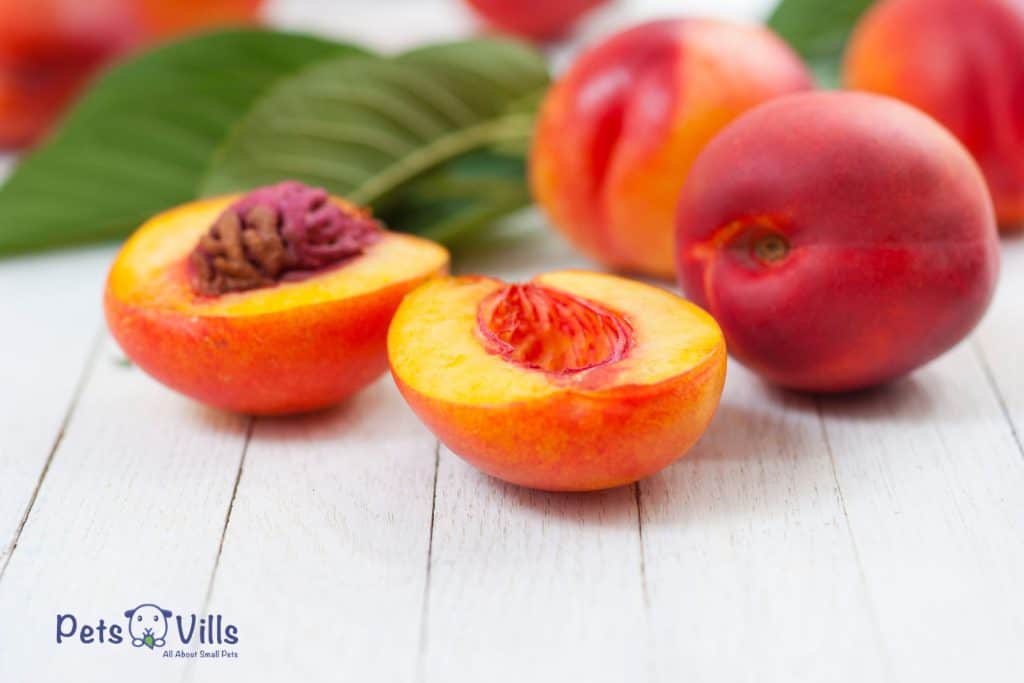
Instead, these fruits should be given to them as a supplement to their diet. So anyone who wants more precise numbers for a chicken diet (4):
- 90% quality commercial feeds
- 10% of nectarines and other fruits
Your chickens will get the exact right amount of nutrition from commercial feeds. The manufacturers make them precisely to meet these dietary needs.
Therefore, feeding nectarines to them once or twice a week is sufficient. I suggest rotating them with other fruits throughout the week as well.
I’ll discuss a few alternatives in the next section.
Other Fruits That Chickens Can Eat
Chickens are capable of eating various fruits without any side effects. Therefore, I thought it’d be fun to spotlight some of my other favorite options!
#1 Lemon
One of the undervalued safe fruits for chickens is lemons. For instance, this citrus is loaded with vitamin C to help promote a healthy metabolism.
The only issue is it’s a citrus fruit, and some chickens won’t eat it. However, if your flock does eat lemons, they can get a significant amount of nutrition from them.
#2 Pineapple
It may sound a little weird, but pineapple is an excellent option for chickens. The fruit is high in all the right areas, such as fiber, minerals, and vitamins.
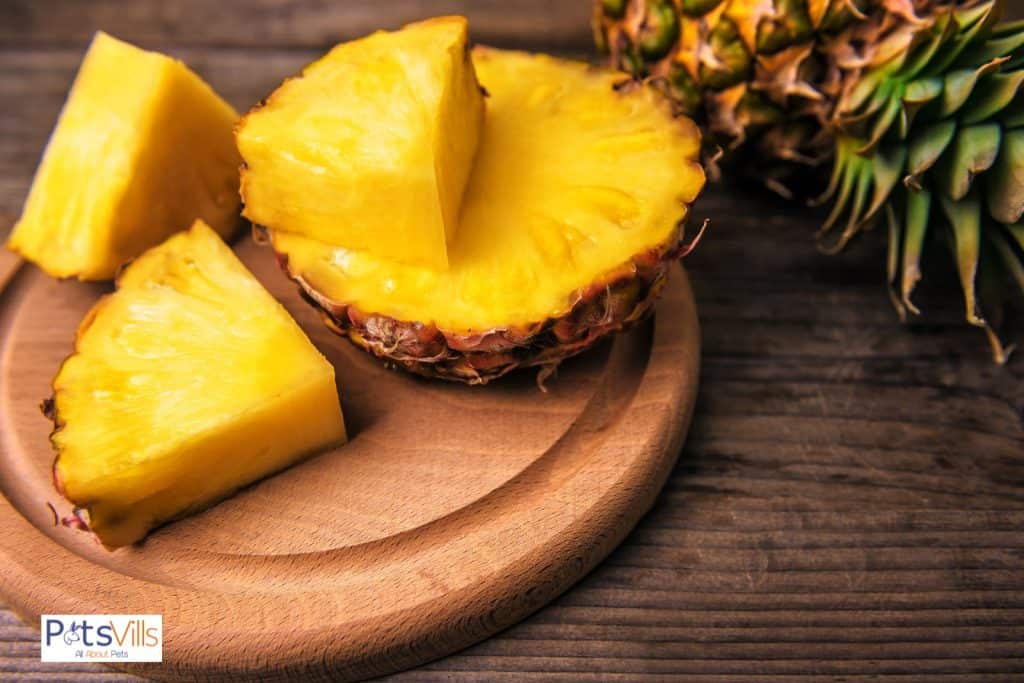
But you must be careful about how much is provided to chickens. For example, pineapple has a very high sugar content and certain unwanted enzymes.
#3 Peaches
Peaches are similar to nectarines, except for the outside appearance. These fruits have furry skin, while nectarines have smooth skin.
This fruit is packed with antioxidants and makes an excellent treat to feed the chickens. I love to rotate them with nectarines occasionally to provide my chickens with variety.
FAQs
#1 What fruits are toxic to chickens?
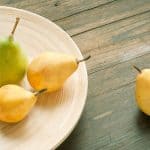
Any fruit with known levels of cyanide found in its seeds or pits will be toxic for chickens. Some examples include cherries, pears, plums, apples, and apricots. But you can still give these fruits to your chickens once the pits/seeds are removed.
#2 What is the healthiest fruit for chickens?
In general, watermelon is the healthiest fruit for chickens. It’ll offer them a great vitamin C, vitamin A, and potassium source. Plus, it’s not too fattening because of its low calories and fat content.
Conclusion
The question of whether can chickens eat nectarines revolves around if you remove the pit, seeds, and leaves. But, if you do, these fruits offer several outstanding benefits to a flock.
You can then expect them to help your chicken’s digestive system and keep them healthy. It’ll become one of the more valuable supplement treats in their diet.
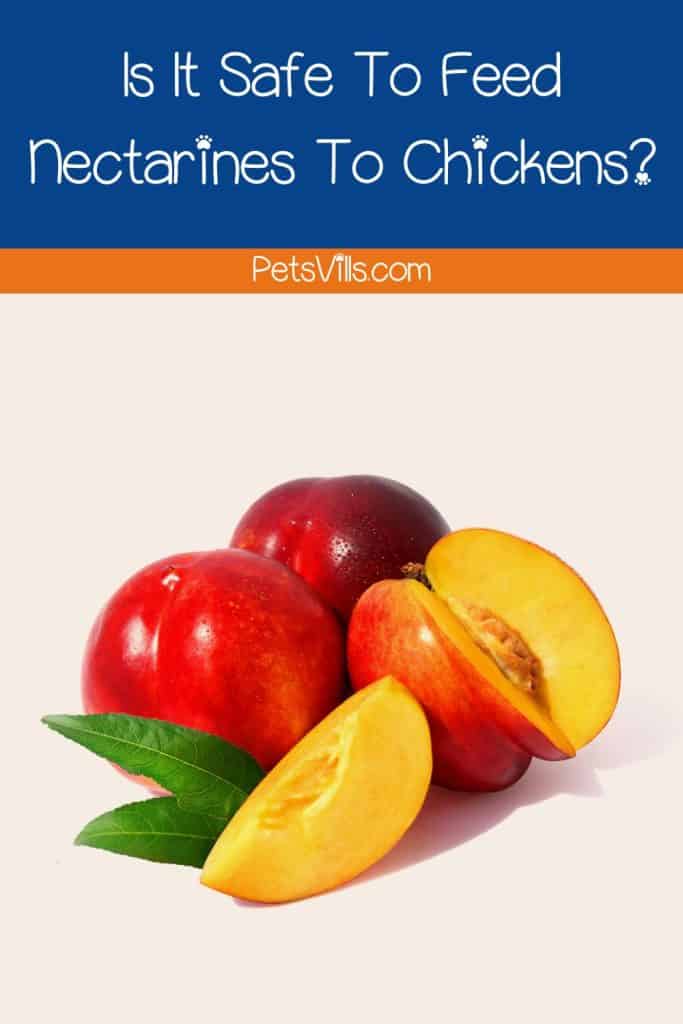
Have you tried feeding your chickens nectarines? Let me know below!
Resources
1. FoodData Central [Internet]. fdc.nal.usda.gov. [cited 2023 Jan 30]. Available from: https://fdc.nal.usda.gov/fdc-app.html#/food-details/327357/nutrients
2. Tryptophan: MedlinePlus Medical Encyclopedia [Internet]. Medlineplus.gov. 2013. Available from: https://medlineplus.gov/ency/article/002332.htm
3. Jaszczak-Wilke E, Polkowska Ż, Koprowski M, Owsianik K, Mitchell AE, Bałczewski P. Amygdalin: Toxicity, Anticancer Activity and Analytical Procedures for Its Determination in Plant Seeds. Molecules. 2021;26:2253.
4. Nutrition for the Backyard Flock [Internet]. extension.uga.edu. Available from: https://extension.uga.edu/publications/detail.html?number=C954&title=nutrition-for-the-backyard-flock
Alina Hartley is a small-town girl with a ginormous love of bearded dragons. It all started with Winchester, a baby bearded who was abandoned at the shelter by his former owners because of a birth defect that caused one front leg to be shorter than the other. Alina originally went to the shelter looking for a guinea pig, but one look at Winchester and it was love at first sight. From that day on, Alina has dedicated her life to learning everything she can about bearded dragons. She loves helping new beardie parents start their incredible journey with these magnificent reptiles.
Follow her on:
LINKEDIN
TWITTER.
Read her latest articles HERE
Learn more about her HERE.

